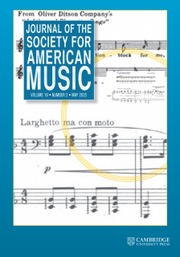Article contents
Music Festivals, Ephemeral Places, and Scenes: Interdependence at Cornerstone Festival
Published online by Cambridge University Press: 15 January 2020
Abstract
Cornerstone was an annual four-day-long Christian rock festival in Illinois that ran from 1984 until 2012, first in Chicago's northern suburbs and then on a former farm in the rural western part of the state. Most attendees camped on-site, and many arrived one or two days early when the campgrounds opened before official programming started. Like many contemporary multi-day festivals in relatively rural or remote locations, Cornerstone's festival grounds and campsites functioned as a temporary village. For many attendees, music festivals have supplanted local scenes as loci of face-to-face musical life. Outside Cornerstone, participants’ musical lives might be curbed by family, professional obligations, geographic separateness, or cultural stratification. Inside the festival's physical, social, and cultural spaces, however, a cohesive music scene manifested for a brief time every year. This article examines the production of space and place at Cornerstone. In doing so, it contributes a vital link between scene theory and the growing ethnomusicological literature on festivals.
- Type
- Research Article
- Information
- Journal of the Society for American Music , Volume 14 , Special Issue 1: Music Festivals , February 2020 , pp. 51 - 69
- Copyright
- Copyright © The Society for American Music 2020
Footnotes
This article expands upon a paper I presented at the annual Society for Ethnomusicology conference in 2015. I would like to thank my fellow panelists (Jayson Beaster-Jones, Maria Sonevytsky, and Aleysia Whitmore) and the audience for their valuable feedback. Additionally, the feedback from David Garcia and this journal's anonymous reviewers provided welcome guidance for improving this piece.
References
- 2
- Cited by


